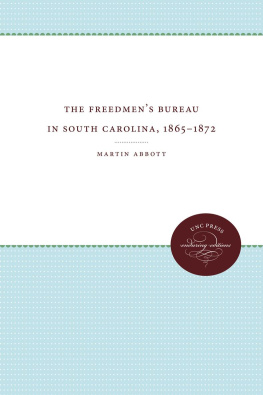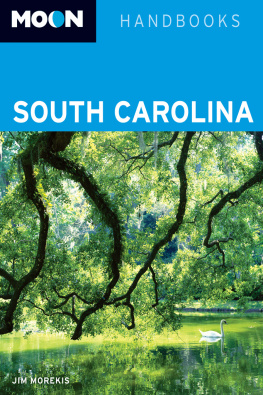The Freedmens Bureau in South Carolina 1865-1872
The Freedmens Bureau in South Carolina 1865-1872
by Martin Abbott
THE UNIVERSITY OF NORTH CAROLINA PRESSCHAPEL HILL
Copyright 1967 by
The University of North Carolina Press
Manufactured in the United States of America
Library of Congress Catalog Card Number 67-26031
Printed by The Seeman Printery, Durham, N.C.
The quotation from John Browns Body which appears on page 3 of this volume is from the Selected Works of Stephen Vincent Bent
Published by Holt, Rinehart and Winston, Inc.
Copyright, 1927, 1928, by Stephen Vincent Bent
Copyright renewed 1955, by Rosemary Carr Bent
Reprinted by permission of Brandt & Brandt
To HELEN, GARY, and JUDITH
Preface
Each generation, it is said, rewrites its own history. Certainly this truism applies with particular force to the era of Reconstruction in American history. For a hundred years historians, writers, and partisans have searched forand disagreed aboutthe nature and significance of the period. Within recent years a number of works have appeared which undertake sweeping revisions of established views, and several more are on the way. Partly, no doubt, this urge to reconsider Reconstruction has been prompted by the arrival of its centennial; the perspective of a century inevitably produces some qualification of older judgments. But mainly, one feels, it has come as a by-product of the continuing urgency of the debate over civil rights for the Negro, as the conscience of the nation has become more engaged in critical questions and vital issues which were first raised, and then left unanswered, by the events of that stormy postwar period. In more ways than one, in fact, the chief legacy of the era is to be found in the unsolved problem of race relations which it bequeathed to posterity for an answer.
Inevitably, much of the revived interest in Reconstruction has concerned itself with the Freedmens Bureau, since it was this agency which faced the main challengeand the greatest opportunityof defining the meaning of freedom for four million bondsmen as they groped their way forth from slavery. Created by Congress in March of 1865, the Bureau would continue its major activities until the close of 1869, and some peripheral work until the end of 1872. During the three and a half years of its primary existence, it operated in all of the former slave states and, under the purpose of promoting the general welfare of the freedmen, came to be concerned with virtually every question affecting their future in a free society. The whole dimension of freedom, in fact, was conditioned by how nearly the agency fulfilled the purposes of its creation.
Yet the real test of the Bureaus worth is to be found not so much in the aims of Congress in creating it, or in the will of the national commissioner in directing it, but, rather, in how well or how feebly it met at the local level the actual needs of those whom it was designed to serve. As a human institution, its ultimate success or failure depended mainly upon the kind of response which its agents and officers in the field gave to the challenge before themhow much they gave in understanding, intelligence, tact, and resourcefulness to provide an answer to the complex question of what freedom had to offer the former bondsmen.
This study is an attempt to answer the question of the Bureaus response in South Carolina. It began years ago as a doctoral dissertation and has undergone extensive revision since then. My concern has been to show how, in this single state, Bureau officials in the counties and communities undertook to transform the aims of the agency into reality. I have also sought to consider the matter of whether, as has long been charged, these men used their office to further the cause of Radical Republicanism among the freedmen. Finally, I have raised some points about what might have been for the South, the Negro, and the nation if the actual achievements of the Bureau had more nearly matched the potential within it.
Like all those engaged in scholarly research, I have incurred many debts along the way. I am sincerely grateful to the staffs of all the libraries mentioned in the bibliography; they have given a uniform courtesy and kindness to my many requests of them. I should also like to thank the Shell Oil Assists Program whose grant to Oglethorpe College made possible a partial subsidy in support of publication of this work.
Finally, I wish to express a warm sense of gratitude to my former mentor at Emory University, Professor Bell I. Wiley. As a scholar and teacher he set me on the road to doing this work in its original form; as a friend and counselor over the years, he has maintained an active interest as I sought to develop new research and to recast the whole into a different form. I can only hope that the result might approach the standards of expectation he set for his graduate students and for himself.
Contents
The Freedmens Bureau in South Carolina 1865-1872
I. The Edge of Freedom
Freedom for the slaves of the South came at different times and in different ways. As the Civil War progressed this day of Jubilo for many arrived with the appearance of Federal armies in their locality; for others it came during a moonless night when they could steal away in the search for its existence; and for those who remained faithfully at work on the land it came at wars end with the sober announcement by the owners that they were free. But however it developed, freedom for most would serve at first to be an exciting yet a strange and bewildering thing.
A childs delight, a brightness too huge to grasp,
The hidden nation, untaught, unrecognized,
Free at last, but not yet free with the free,
Ignorant, joyful, wronged, child-minded and searching,
Searching the armys road for this new wild thing
That means so much but cant be held in the hand,
That must be there, that yet is so hard to find,
This dream, this pentecost changing, this liberty.1
More personally, a former slave would recall in late life: What I likes best, to be slave or free? Well, its this way. In slavery I owns nothing and never owns nothing. In freedom Is own the home and raise the family. All that cause me worriment, and in slavery I has no worriment, but I takes the freedom.2
Actual freedom for many, and perhaps for most, did not come until the war had ended; constitutionally, it became a reality only with the ratification of the Thirteenth Amendment in December, 1865. But the commitment of the nation to the principle of freedom for all had been made in 1863 when President Lincoln had issued the Emancipation Proclamation, declaring the essential inconsistency of slavery with the American democratic creed. The Proclamation thus had answered one question, that of the future of human bondage in America; but it had left unanswered another that was no less critical, that of the future place of the former bondsmen in a free society. Unless slavery had been what it was not, and could never bea training school for citizenshipthe four million Negroes still living under it in 1860 were bound to be ill-prepared for the challenge of freedom. As free men they would find new and bewildering obligations to be faced; new and different rights for which, as yet, they had neither the training nor the social experience. The transition which they must undergo was certain to be neither short nor painless. And unless they were given guidance, direction, encouragement, and aid, the promise of freedom might prove to be a deceptively cruel illusion.








